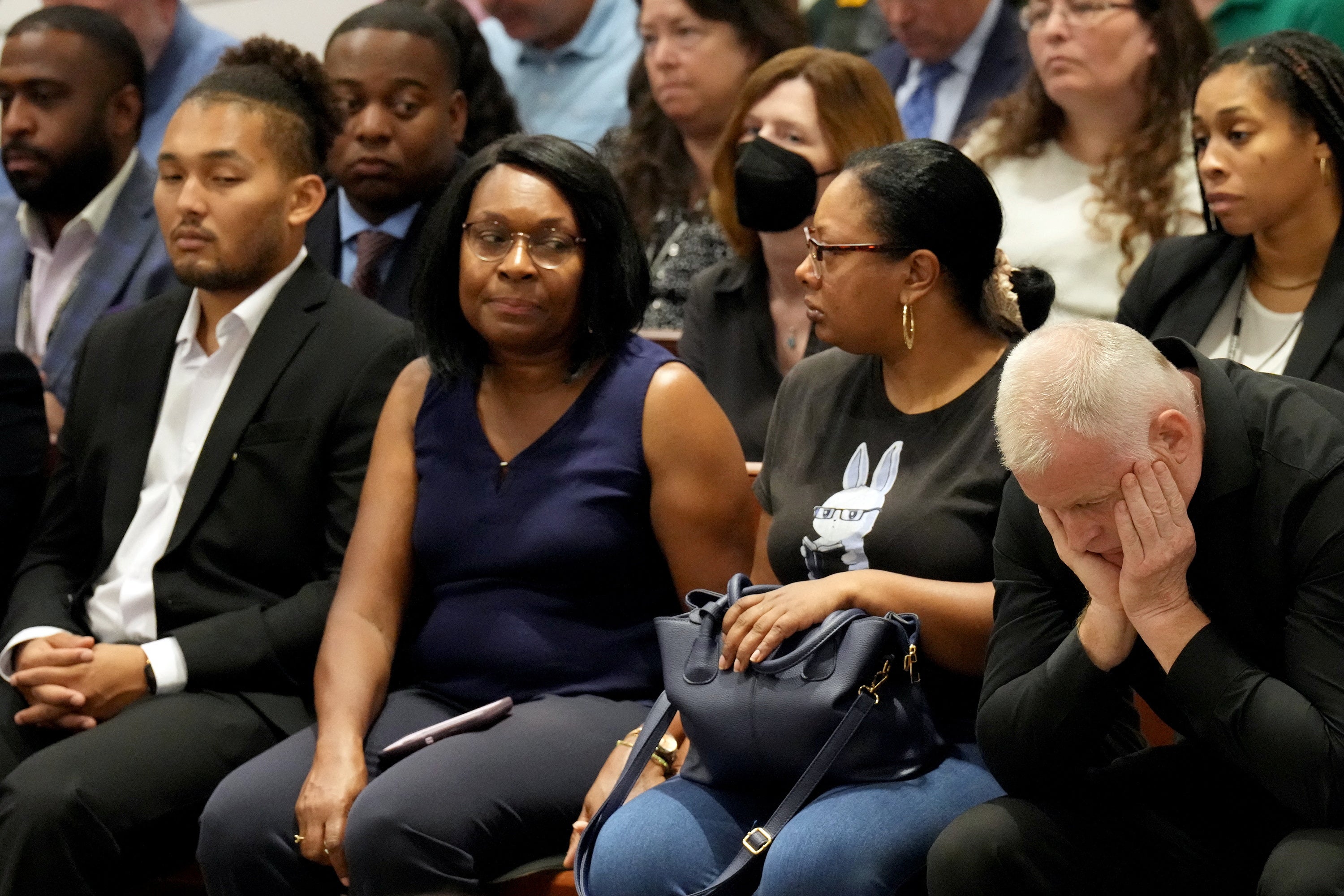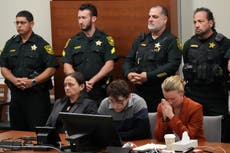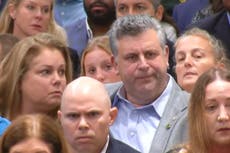Parkland families’ outrage over Nikolas Cruz verdict highlights a key issue with death penalty trials
Families oppose verdict from jury, even though it was screened with controversial ‘death qualification’ process. Josh Marcus reports


A Florida jury handed Parkland shooter Nikolas Cruz a life sentence without parole for killing 14 students and three staff in a 2018 mass shooting at Marjory Stoneman Douglas High School on 12 October.
The verdict, which spared the 24-year-old a potential death sentence, outraged a number of Parkland families, and it exposed the challenges of a controversial practice known as “death qualification,” which is designed to insure opponents of capital punishment never make it on juries.
Here’s what you need to know about the controversy:
What are Parkland families saying about the verdict?
A number of families tied to the massacre criticised the final sentence as insufficient for the magnitude of the crime Cruz committed.
“Jail is about rehabbing someone. There is no rehabbing [Cruz],” Ilan Alhadeff, father of slain student Alyssa Alhadeff, told reporters after the 12-person jury reached its decision.
“I pray that animal suffers every day of his life in jail. And it should be a short life,” he continued.

“I don’t know how this jury came to the conclusions that they did today,” Fred Guttenberg, who lost his daughter Jaime in the shooting, said after the decision. “But 17 families did not receive justice. Because of what happened to our families, we are all in this position now of doing the work that we do around this country to keep this from happening to another family, and this decision today only makes it more likely that the next mass shooting will be attempted.”
Florida Governor Ron DeSantis weighed in as well, saying the sentence “stings.”
“I think that if you have a death penalty at all, that this is a case where you’re massacring those students with premeditation and utter disregard for basic humanity, that you deserve the death penalty,” he said.
Experts are skeptical the death penalty has much of a deterent effect on major crimes, but the criticism following the case illustrates the pressure on high-profile prosecutions to deliver death penalty convictions—and the controversy that can strike when they choose not to.
How did the jury reach its decision?
Shortly after the verdict was rendered, a juror informed a court staffer they felt threatened during deliberations, prompting prosecutors to ask Judge Elizabeth Scherer to investigate.
“Juror X spoke to a support staff member and informed the support staff member that during deliberations she received what she perceived to be a threat from a fellow juror while in the jury room,” states the filing, obtained by CNN.
The jury deliberation came under further scrutiny when foreperson Benjamin Thomas told WFOR of a supposed “holdout” whose opposition to the death penalty and executing mentally ill people prevented the unanimous agreement needed to order an execution.
“There was one with a hard no. She couldn’t do it. And there was another two that ended up voting the same way,” he told the station.
The juror, identified in The Sun-Sentinel as Denise Cunha, of Pembroke Pines, Florida, has offered her own filing to the court, saying she didn’t make up her mind until she heard all the evidence.
“I maintained my oath to the court that I would be fair and unbiased,” she reportedly told the judge. “The deliberations were very tense and some jurors became extremely unhappy once I mentioned that I would vote for life.”
How was the jury selected?
Jury selection began this spring, whittling a pool of 1,800 candidates down to the seven men and five women ultimately selected to consider the case.
They were asked about their opinions on law enforcement, guns, and, most crucially, their thoughts on capital punishment and whether their opinions about or opposition to the death penalty would sway their judgement.
In May, the court temporarily postponed jury selection, after Judge Scherer first struck 11 candidates who opposed the death penalty, then called them back into consideration and allowed attorneys to ask follow-up questions about whether these jurors could set their opinions about executions aside. The confusion prompted the defence to seek a mistrial.
The wrangling over the questioning is part of the process of making sure juries are what’s known as “death qualified,” with all panelists open to potentially imposing a death sentence.
The practice is a highly controversial one, with critics arguing that with declining support for the death penalty, and wide variations among racial and political groups’ support for executions, death qualification can end denying defendants of their constitutional right to an impartial jury of their peers.
“Death qualification is as sinister as it sounds, and it’s demonstrably racist,” the American Civil Liberties Union argued in an article this August.
“Disproportionate numbers of Black jurors and jurors of faith, especially Catholics, are excluded from death penalty juries,” it added. “Combined with the prosecutor’s use of peremptory strikes — or removing jurors without providing a reason — death penalty juries end up being overwhelmingly white, male, and biased in favor of the prosecution and death.”
Courts, however, allow such questioning, part of a larger set of histories and legal precedents that have combined to make the death penalty apply disproportionately to people of colour in the US.
“From its inception, in this country, the death penalty and racism were inseparable,” Elisabeth Semel, a law professor who heads University of California Berkeley’s Death Penalty Clinic told The Independent last year. “That history is defining. It just is defining.”
Does anyone support a life sentence for Nikolas Cruz?
In addition to the three jurors, some of the Parkland families themselves agreed that Cruz, who the defence argued was severely mentally ill as a result of his mother’s substance abuse while she was pregnant, should get a life sentence.
Robert Schentrup, whose 16-year-old sister Carmen was killed in the shooting, told CNN last week he didn’t support to the death penalty for Cruz—or anyone.
“Logically, it doesn’t follow for me that we say, ‘Murdering someone is this horrible, heinous, awful, terrible thing, and in order to prove that point, we’re going to do it to someone else,’” he said.
“And I understood that if this is something that I felt that I believe that it needed to apply in my personal case and beyond,” he said. “I had to look deep into my values and say, is this something that connects with it? And if so, live through that.”
Others tied to horrific tragedies have said similar things.
As The Independent has reported, the families of victims of some of the worst terror and hate attacks in US history are split on whether the perpetrators deserve the life sentence.
In 2015, white supremacist Dylan Roof shot and killed nine people at a historic Black church in Charleston, South Carolina, after they had welcomed him into their Bible study session.
The dead included Reverend Sharon Risher’s mother, Ethel Lance, and her cousins Susie and Tywanza Sanders, as well as a number of dear friends. Tywanza, at 26 the youngest victim, died trying to shield Susie, the oldest at 87, from Roof’s gun.
“In my heart, as my mother’s child, I wanted him to be dead like her,” she told The Independent. “Going back to my Christian faith, I knew that I didn’t want that. I realised that even though he had done this horrific thing, my faith tells me that God is a God of restoration and redemption.”
This story was originally published on 14 October and was updated on 1 November as Cruz’s sentencing hearing began.
The Independent and the nonprofit Responsible Business Initiative for Justice (RBIJ) have launched a joint campaign calling for an end to the death penalty in the US. The RBIJ has attracted more than 150 well-known signatories to their Business Leaders Declaration Against the Death Penalty - with The Independent as the latest on the list. We join high-profile executives like Ariana Huffington, Facebook’s Sheryl Sandberg, and Virgin Group founder Sir Richard Branson as part of this initiative and are making a pledge to highlight the injustices of the death penalty in our coverage.



Bookmark popover
Removed from bookmarks